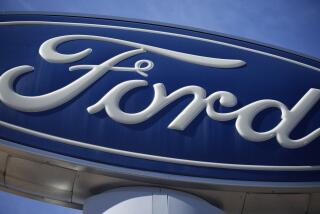GM to Stay the Course on Big Trucks Despite Challenges
- Share via
When General Motors Corp. was laying plans a few years ago to redo its profitable line of big sport utility vehicles, gasoline seemed cheap, Americans were in love with the hulking SUVs, and it looked like all green lights and open highways.
No more -- and the timing couldn’t be worse for GM.
The company sells more big SUVs than all other automakers combined, and through August of this year sales of the truck-based vehicles were down 9.7% in the U.S. after a 6.7% decline in 2004.
These slumping sales are one reason the automaker lost nearly $1.4 billion in the first six months of this year.
Come January, GM will start rolling out a redesigned lineup of all its full-size SUVs and pickups. The automaker is counting on these 2006 models to help stem its losses.
But with gasoline prices at near-record highs, consumers seem to have lost some of their appetite for the company’s Chevrolet Suburban, GMC Yukon, Hummer H2, Cadillac Escalade and other big SUVs. These vehicles weigh 2 1/2 tons, get 13 to 15 miles per gallon in town and cost $35,000 to $70,000, and analysts aren’t excited about the prospects for GM’s new model lineup.
Many motorists “had an epiphany at the pumps this year,” said David Healy, auto industry analyst at Burnham Securities. “They can afford the gas, but they’ve started wondering whether they really want to spend that much filling up the tank, and they start looking at smaller, more fuel-efficient models.”
“[GM] definitely has got their work cut out for them,” he said.
“Selling big SUVs is going to be like paddling upstream, a lot of hard work,” said George Pipas, chief U.S. market analyst at Ford Motor Co. Ford, which has new models of the full-size Ford Expedition and Lincoln Navigator SUVs coming next year, has seen its large SUV sales sag 18% this year.
But the big trucks are so vital to U.S. automakers that GM has no choice. It sells more than 500,000 large SUVs a year, plus about 1 million full-size pickups, accounting for nearly one-third of its passenger vehicle sales.
“The backdrop is not ideal,” said Paul Ballew, GM’s chief economist, “but we have to accentuate the positive.” The big trucks, he said, “are important to our profits, our volume and our image.”
Deutsche Bank analyst Rod Lache estimated that GM earned at least $5 billion in pretax profit from those big trucks last year: $2 billion from large pickups and $3 billion from SUVs.
One plus for GM is that pickup sales aren’t expected to suffer -- buyers typically rationalize the trucks as necessities, either for work or for lifestyles that demand vehicles capable of toting heavy loads or towing such things as boats and camping trailers.
Even as large SUV sales have slumped this year, industrywide sales of full-size pickups in the U.S. increased by 8.3% through August. So GM is hopeful that its redesigned big pickups, such as the Chevy Silverado, GMC Sierra and Chevy Avalanche, will move quickly.
As for big SUVs, automakers argue that these are costly vehicles whose buyers tend to be well-heeled and largely immune to rising gas prices.
But that doesn’t jibe with what market researchers are discovering.
“I think we’ll see that the full-size [SUV] segment has plateaued,” J.D. Power & Associates economist Bob Schnorbus said.
During the summer, GM, Ford and Chrysler Group offered employee discount pricing plans to sell their 2005 model inventory, but those programs are almost over.
“They were using huge incentives to push people into those vehicles who probably shouldn’t have bought them, because they were too expensive or too big for what they really needed, and now the tide is turning,” said Dan Gorrell, head of automotive operations at San Diego-based Strategic Vision, a market research firm.
Next year, full-size SUV sales will fall an additional 11% in the U.S., predicts analyst Rebecca Lindland of Global Insight in Lexington, Mass.
GM’s launch schedule starts early next year with the Chevrolet Tahoe SUVs and derivatives, the GMC Yukon and the upscale Cadillac Escalade and GMC Denali models.
“A lot of customers know they are coming and can’t wait,” said Harold Meek, owner of Three-Way Chevrolet in Bakersfield -- one of GM’s biggest truck retailers.
GM hopes to combat the weakening SUV market by aggressively promoting new features, lower base prices, sleeker styling, improved interiors and better stereo systems.
The company’s SUVs, which already boast the industry’s best mileage -- a modest claim when best can be 13 mpg in the city and 18 mpg on the highway -- also will sport a new technology that shuts down four of an engine’s eight cylinders when the trucks are cruising.
The result: Fuel efficiency will improve by an average of 1 mpg.






